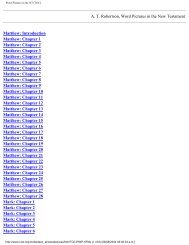Commentary on Joshua - Keil & Delitzsch - David Cox
Commentary on Joshua - Keil & Delitzsch - David Cox
Commentary on Joshua - Keil & Delitzsch - David Cox
You also want an ePaper? Increase the reach of your titles
YUMPU automatically turns print PDFs into web optimized ePapers that Google loves.
<strong>Keil</strong> and <strong>Delitzsch</strong> <str<strong>on</strong>g>Commentary</str<strong>on</strong>g> <strong>on</strong> the Old Testament<br />
round, <strong>on</strong> the seventh day, that the people were to raise the war-cry at the command<br />
of <strong>Joshua</strong>, and then the walls of the town were to fall (vv. 10,<br />
16). There can be no doubt that we are right in assuming that <strong>Joshua</strong> had received<br />
from the angel the command which he issued to the people in vv. 17ff., that the whole<br />
town, with all its inhabitants and everything in it, was to be given up as a ban to the<br />
Lord, at the time when the first announcement c<strong>on</strong>cerning the fall of the town was<br />
made.<br />
Verse 8-10. Executi<strong>on</strong> of the divine Command. - Vv. 8-11. The march round <strong>on</strong> the<br />
first day; and the instructi<strong>on</strong>s as to the war-cry to be raised by the people, which are<br />
appended as a supplement in v. 10. "Before Jehovah," instead of "before the ark of<br />
Jehovah," as the significati<strong>on</strong> of the ark was derived entirely from the fact, that it was<br />
the medium through which Jehovah communicated His gracious presence to the<br />
people. In v. 9, taaqª`uw (OT:8628) is in the perfect tense, and we must supply the<br />
relative 'asher (OT:834), which is sometimes omitted, not <strong>on</strong>ly in poetry, but also in<br />
prose, after a definite noun in the accusative (e.g., Ex 18:20; see Ewald , §332, a. ).<br />
There is not sufficient ground for altering the form of the word into toqª`eey<br />
(OT:8628), according to the Keri , as taaqa` (OT:8628) is c<strong>on</strong>strued in other cases<br />
with the accusative hashowpaar (OT:7782), instead of with bª , and that not <strong>on</strong>ly in<br />
poetry, but also in prose (e.g., Judg 7:22, as compared with vv. 18-20). wªtaaqowa`<br />
(OT:8628) haalowkª (OT:3212), "trumpeting c<strong>on</strong>tinually" ( Eng. Ver. "going <strong>on</strong> and<br />
blowing"). haalowkª (OT:3212) is used adverbially, as in Gen 8:3, etc.<br />
Verse 11. "So the ark of the Lord compassed the city," not "<strong>Joshua</strong> caused the ark<br />
to compass the city." The Hiphil has <strong>on</strong>ly an active, not a causative, meaning here, as<br />
in 2 Sam 5:23, etc.<br />
Verse 12-14. The march <strong>on</strong> each of the next five days resembled that <strong>on</strong> the first. "So<br />
they did six days." In v. 13, wªtaaqª`uw (OT:8628) does not stand for wªtaaqowa`<br />
(OT:8628), but corresp<strong>on</strong>ds to wªtaaqª`uw (OT:8628) in<br />
v. 8; and the participle howleekª (OT:1980) is used interchangeably with the inf. abs.<br />
haalowkª (OT:3212), as in Gen 26:13; Judg 4:24, etc., so that the Keri haalowkª<br />
(OT:3212) is an unnecessary emendati<strong>on</strong>.<br />
http://207.44.232.113/~bible/comment/ot/k&d/josh/jos28.html (2 of 3) [13/08/2004 01:17:16 p.m.]
















